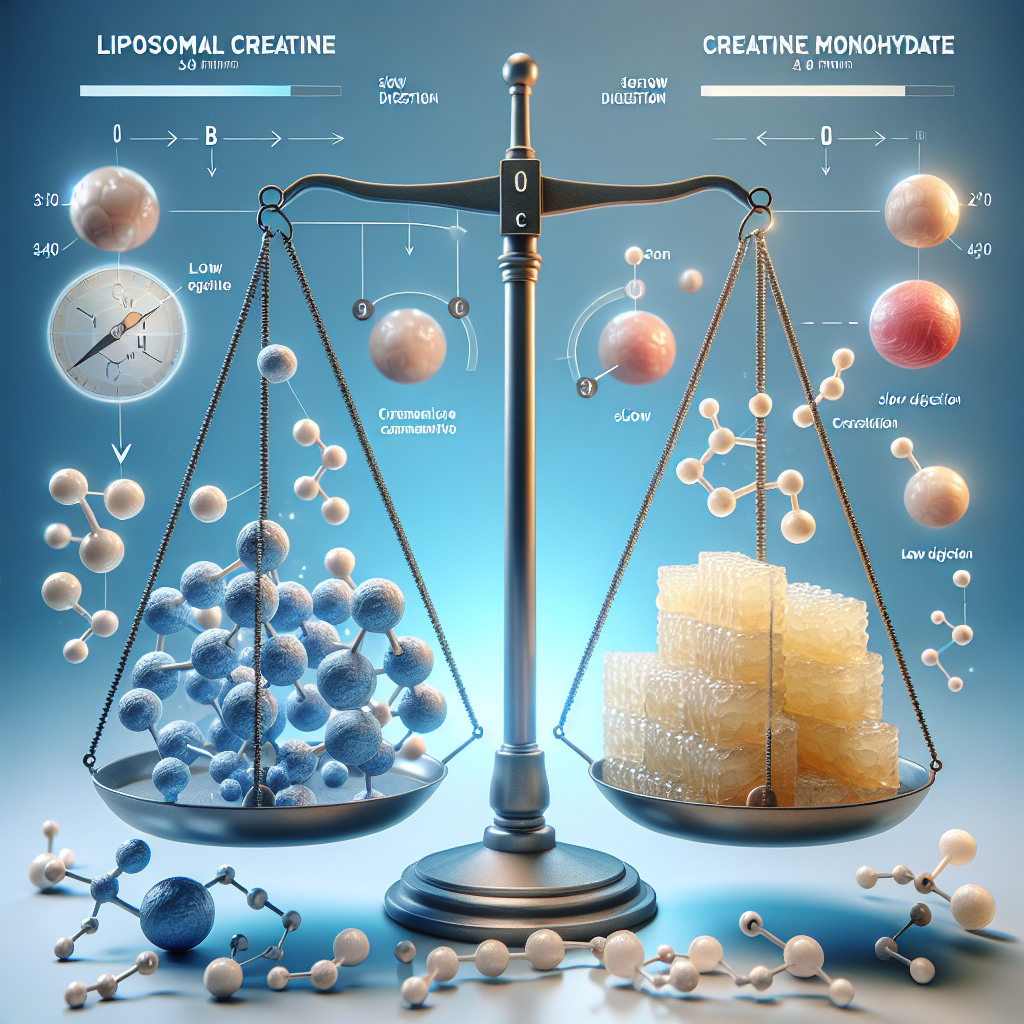Liposomal Creatine vs Creatine Monohydrate: Comparison
-
Table of Contents
- Liposomal Creatine vs Creatine Monohydrate: In-Depth Comparison
- Understanding Creatine Supplementation
- What is Creatine Monohydrate?
- What is Liposomal Creatine?
- Comparing Absorption and Bioavailability
- Efficacy in Enhancing Performance
- Side Effects and Tolerability
- Cost Considerations
- Conclusion: Making the Right Choice for Your Goals
- Explore ETchem’s Protein Products
Liposomal Creatine vs Creatine Monohydrate: In-Depth Comparison

Creatine is a well-known supplement in the fitness and sports industry, praised for its ability to enhance performance, increase muscle mass, and improve strength. Among the various forms of creatine available on the market, Creatine Monohydrate and Liposomal Creatine are two popular choices. This article delves into the differences between these two forms, examining their efficacy, absorption rates, and overall benefits to help you make an informed decision.
Understanding Creatine Supplementation
Creatine is a naturally occurring compound found in small amounts in certain foods and produced by the body. It plays a crucial role in the production of energy during high-intensity, short-duration exercises. Supplementing with creatine can increase the body’s stores of phosphocreatine, which helps regenerate the primary energy molecule, ATP (adenosine triphosphate).
What is Creatine Monohydrate?
Creatine Monohydrate is the most researched and commonly used form of creatine. It consists of a creatine molecule bound to a water molecule and is known for its effectiveness and affordability. Creatine Monohydrate has been shown to:
- Enhance muscle mass
- Improve strength and power output
- Boost recovery between exercise sets
- Enhance cognitive function
What is Liposomal Creatine?
Liposomal Creatine is a newer form of creatine that is encapsulated within liposomes. Liposomes are tiny, spherical vesicles that can be filled with drugs or supplements, designed to improve the delivery and absorption of their contents. The theory behind Liposomal Creatine is that the liposomal encapsulation can:
- Enhance absorption and bioavailability
- Reduce gastrointestinal discomfort
- Provide a sustained release of creatine
- Improve cellular uptake
Comparing Absorption and Bioavailability
One of the main differences between Liposomal Creatine and Creatine Monohydrate lies in their absorption rates and bioavailability. Creatine Monohydrate is absorbed relatively well by the body, but some individuals may experience gastrointestinal issues or suboptimal absorption. Liposomal Creatine aims to address these concerns by providing a more efficient delivery system.
Studies on liposomal delivery systems suggest that they can protect the active ingredient from degradation in the digestive system and enhance uptake by cells. However, research specifically on Liposomal Creatine is limited, and more studies are needed to confirm its superiority over Creatine Monohydrate in terms of absorption and bioavailability.
Efficacy in Enhancing Performance
The primary reason for using creatine supplements is to improve athletic performance. Creatine Monohydrate has a proven track record, with numerous studies supporting its effectiveness in increasing strength, power, and muscle mass. Liposomal Creatine is believed to offer the same benefits, but due to its relatively recent introduction to the market, there is less scientific evidence available.
Until more research is conducted, it’s difficult to definitively state whether Liposomal Creatine is more effective than Creatine Monohydrate in enhancing performance. However, the potential for improved absorption could suggest benefits for those who have not responded well to Creatine Monohydrate in the past.
Side Effects and Tolerability
Both forms of creatine are generally considered safe when used as directed. Creatine Monohydrate may cause side effects such as bloating, water retention, and gastrointestinal distress in some users. Liposomal Creatine is marketed as a gentler option, potentially reducing these side effects due to its encapsulation.
It’s important to note that individual responses to creatine supplements can vary, and what works well for one person may not work for another. Monitoring your body’s reaction to different forms of creatine is key to finding the most suitable option.
Cost Considerations
When it comes to cost, Creatine Monohydrate is typically more affordable than Liposomal Creatine. This is due to its widespread availability and the simplicity of its production process. Liposomal Creatine, being a more complex and newer product, often comes with a higher price tag.
For those on a budget or just starting with creatine supplementation, Creatine Monohydrate may be the more economical choice. However, if you’re looking for potentially enhanced absorption and are willing to invest more, Liposomal Creatine could be worth exploring.
Conclusion: Making the Right Choice for Your Goals
In conclusion, both Liposomal Creatine and Creatine Monohydrate have their own set of advantages and potential drawbacks. Creatine Monohydrate is backed by extensive research and is known for its cost-effectiveness, while Liposomal Creatine promises improved absorption and tolerability, albeit at a higher cost and with less scientific evidence.
The decision between the two should be based on individual goals, budget, and response to supplementation. It’s always recommended to consult with a healthcare professional before starting any new supplement regimen.
Explore ETchem’s Protein Products
If you’re looking to enhance your nutrition and supplement routine further, consider exploring ETchem’s range of protein products. ETchem offers high-quality protein supplements that can complement your fitness goals and support your overall health.
About ETChem:
ETChem, a reputable Chinese Collagen factory manufacturer and supplier, is renowned for producing, stocking, exporting, and delivering the highest quality collagens. They include marine collagen, fish collagen, bovine collagen, chicken collagen, type I collagen, type II collagen and type III collagen etc. Their offerings, characterized by a neutral taste, instant solubility attributes, cater to a diverse range of industries. They serve nutraceutical, pharmaceutical, cosmeceutical, veterinary, as well as food and beverage finished product distributors, traders, and manufacturers across Europe, USA, Canada, Australia, Thailand, Japan, Korea, Brazil, and Chile, among others.
ETChem specialization includes exporting and delivering tailor-made collagen powder and finished collagen nutritional supplements. Their extensive product range covers sectors like Food and Beverage, Sports Nutrition, Weight Management, Dietary Supplements, Health and Wellness Products, ensuring comprehensive solutions to meet all your protein needs.
As a trusted company by leading global food and beverage brands and Fortune 500 companies, ETChem reinforces China’s reputation in the global arena. For more information or to sample their products, please contact them and email karen(at)et-chem.com today.




